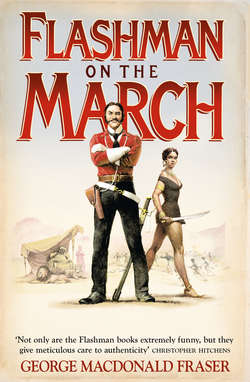Читать книгу Flashman on the March - George Fraser MacDonald - Страница 9
EXPLANATORY NOTE
ОглавлениеIn the campaigns covered by the first eleven packets of his autobiographical Papers – Afghanistan, First Sikh War, Crimea, Indian Mutiny, Brooke’s expedition against the Borneo pirates, the march to Pekin, Custer’s Little Big Horn debacle – Sir Harry Flashman, V.C., etc., the notorious Victorian hero and poltroon, has always been at or near the heart of the action, a reluctant and often jaundiced eye-witness of people and events, and uncomfortably aware of history unfolding about him.
Not so in the Abyssinian War of 1868, surely the strangest of all imperial campaigns, when a British Indian army invaded one of the least known and most dangerous countries on earth, and in the face of apparently insuperable hazards, and predictions of certain failure, marched and fought their way across a trackless wilderness of rocky chasm and jagged mountain to their goal, did what they had come to do, and marched out again with hardly a casualty. There has never perhaps been a success like it in the history of war. It took twelve thousand men, a mighty fleet, nine million pounds (a staggering sum at that time), a meticulous if extravagant organisation, and a remarkable old soldier – and all to rescue a tiny group of British citizens held captive by a mad monster of an African king. Those were, to quote Flashman, the days.
But if he bore no share in the campaign proper, Flashman’s was still the vital part on which success or failure hung – the intelligence mission which was to take him into a series of fearful perils (some of them new even to him) in a war-torn land of mystery, treachery, intrigue, lonely castles, ghost cities, the most beautiful (and savage) women in Africa, and at last into the power of the demented tyrant in his stronghold at the back of beyond. All of which he records with his customary shameless honesty, and it may be that along with the light he casts on a unique chapter of imperial history, he invites a comparison with a later and less glorious day.
For Flashman’s story is about a British army sent out in a good and honest cause by a government who knew what honour meant. It was not sent without initial follies and hesitations in high places, or until every hope of a peaceful issue was gone. It went with the fear of disaster hanging over it, but with the British public in no doubt that it was right. It served no politician’s vanity or interest. It went without messianic rhetoric. There were no false excuses, no deceits, no cover-ups or lies, just a decent resolve to do a government’s first duty: to protect its people, whatever the cost. To quote Flashman again, those were the days.
As with previous Papers, I have merely corrected his spelling, which in this instance meant introducing consistency into his bizarre renderings of Abyssinian names.
G.M.F.
